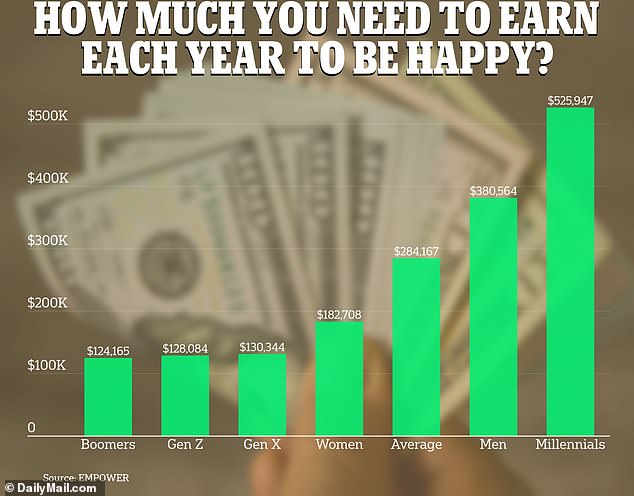According to a survey, baby boomers are happy with an annual salary of $124,000, while millennials say they need more than $500,000 to be happy.
About six in 10 Americans believe money can buy happiness, according to financial services firm Empower’s survey, which was based on online responses from 2,034 Americans over a weeklong period in August.
The median household income in the United States is about $74,000 per year, but respondents said they need to earn about $284,000 each year to be happy.
Millennials reported their highest desired annual income at $525,000, more than four times higher than Gen Z, Generation X and Baby Boomer respondents.
The study examined more than just annual income. To be happy, Millennials said they needed a net worth of $1,699,571 – more than three times more than Generation Z and almost twice as much as Baby Boomers.

The median household income in the United States is about $74,000 per year, but Millennials reported their desired annual salary is $525,000 – more than four times higher than other age groups
There were also stark gender differences, with male respondents reporting their desired net worth at $1,488,327. For women, the figure was just $880,950.
According to the company, millennials may have higher expectations due to experiences such as the 2008 housing crisis and the instability caused by the pandemic.
But for many Americans, the survey found, happiness isn’t just about achieving a certain level of wealth — it manifests itself in ways big and small.
The majority of respondents said that being able to pay bills on time and live debt-free contributed greatly to their overall satisfaction.
About half of Americans value the ability to afford small luxuries and pay for experiences with loved ones without feeling guilty.
Two in five Americans consider buying or owning a home as important as having a good work-life balance, while more than a third say being able to retire when they want is important.
Many Americans say that the ability to treat yourself also plays a big role in happiness.
A full 96 percent of those surveyed said that a purchase increased their enjoyment of life, while 88 percent attributed this to experiences.

Millennials said they needed a net worth of $1,699,571 to be happy – more than three times more than Generation Z and almost twice as much as Baby Boomers

The majority of respondents said that the ability to pay bills on time and live without debt contributed significantly to their happiness
For some, the price of happiness can be boiled down to a cup of coffee, as 62 percent of Millennials say they are willing to spend $7 on coffee because of the joy it brings.
However, three out of four Americans said they were happier at work and with their relationships than with their overall wealth.
This could be because 67 percent say their income is not keeping up with inflation and 42 percent say their standard of living is falling.
Respondents cited rising costs (81 percent), interest rates (66 percent) and student debt (32 percent) as their top concerns.
Inflation has reached its lowest level in over two years and the unemployment rate has long been below 4 percent since the 1960s.
However, many Americans say their household expenses exceed their annual income.
Those concerns were reflected in a poll conducted last month by The Associated Press-NORC Center for Public Affairs Research.
About three-quarters of respondents described the economy as bad. Two-thirds said their expenses had increased and only a quarter said their income had increased.

